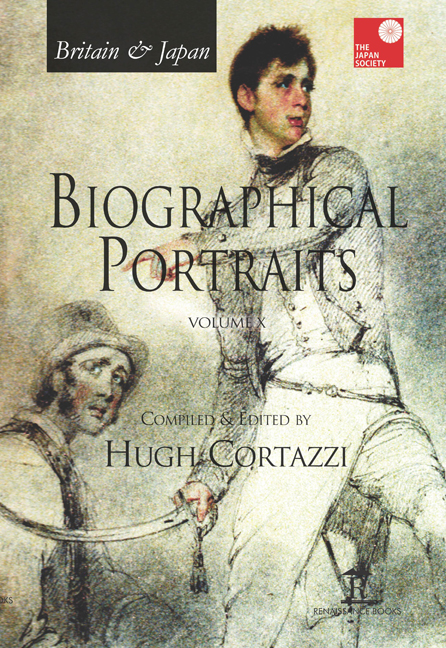Book contents
- Frontmatter
- Dedication
- Contents
- Introduction
- List of Contributors
- Index of Biographical Portraits in Japan Society Volumes
- PART I BRITAIN IN JAPAN
- PART II JAPAN IN BRITAIN
- Select Bibliography of Works in English on Anglo-Japanese Relations [Compiled by Gill Goddard – Retired East Asian Studies Librarian, University of Sheffield]
- Select Bibliography of Works in Japanese on Anglo-Japanese Relations [Compiled by Akira Hirano, SISJAC]
- Index
51 - Kazuo Chiba (1925–2004): An Outstanding Japanese Diplomat
Published online by Cambridge University Press: 07 May 2022
- Frontmatter
- Dedication
- Contents
- Introduction
- List of Contributors
- Index of Biographical Portraits in Japan Society Volumes
- PART I BRITAIN IN JAPAN
- PART II JAPAN IN BRITAIN
- Select Bibliography of Works in English on Anglo-Japanese Relations [Compiled by Gill Goddard – Retired East Asian Studies Librarian, University of Sheffield]
- Select Bibliography of Works in Japanese on Anglo-Japanese Relations [Compiled by Akira Hirano, SISJAC]
- Index
Summary
INTRODUCTION
KAZUO CHIBA WHO was born on 19 April 1925 died on 14 September 2004, aged seventy-nine. He was Japanese Ambassador to the Court of St James's from 1988 to 1991. He spoke and wrote impeccable English. He was outspoken in his opinions, but combined frankness with an easy charm, a quick wit and an English sense of humour. He was an outstanding representative of his country who developed a deep interest in Britain and worked hard to promote better understanding.
EDUCATION
Kazuo Chiba was the son of Chiba Shin’ichi whose first diplomatic post had been in the Japanese delegation to the Versailles Peace Treaty and who had specialized in French. When the family was living in Paris Kazuo was sent by his parents to an English school in the Rue de Courcelles run by a Mr Harvey. Although he was ‘chastised by the sons of a Chinese (Kuomintang) diplomat for some puerile nationalistic remarks on my part about the, then current, invasion of Shanghai by Japanese forces, on the whole I had a good time, made friends and learned not only the English language but also the British outlook through studying history, geography and literature.’
On his family's return to Tokyo Kazuo went first to a Japanese elementary school where the ‘The general view of Britain was that of “a has-been power”. An old mangy lion, with decayed fangs.’ When he reported this to his father he was told that this was wrong and he should ‘never underestimate a mettlesome nation like the British’. He went on to the Peers’ School (Gakushuin). There ‘peer pressure and teachers’ face caused [him] to superimpose a Japanese accent on my King's English’.
In 1944 he was accepted by the Imperial Japanese Navy as a reserve officer candidate. In the Japanese navy he was struck by the deep influence of the Royal Navy. He did his basic training at the erstwhile Port Arthur on the Kwantung Peninsula. Just before the end of the course Kazuo went down with pneumonia. After a stint at Yokosuka he was posted to Kure where because of his knowledge of English he was assigned to intelligence duties and ‘put to work on intercepting voice radio traffic of the US radar picket destroyer screen network surrounding Okinawa’. At Kure he was close to Hiroshima.
- Type
- Chapter
- Information
- Britain & Japan Biographical Portraits Vol X , pp. 577 - 583Publisher: Amsterdam University PressPrint publication year: 2016



